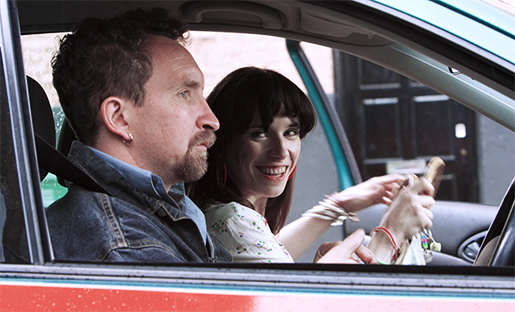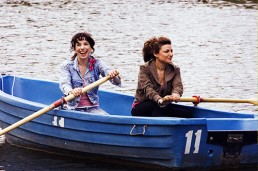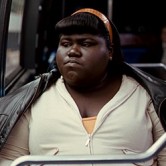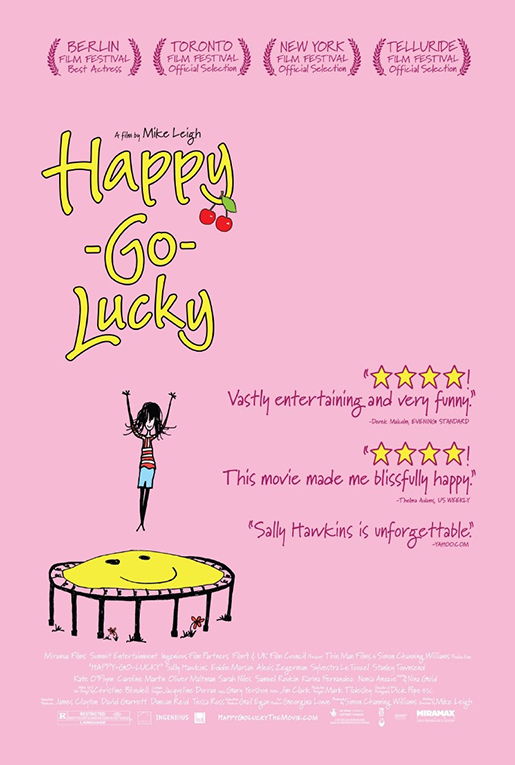Movie Review: HAPPY-GO-LUCKY (2008)
![]()

Driven Conversations About One Thing
Pauline ‘Poppy’ Cross, the title character of Mike Leigh’s winning comedy Happy-Go-Lucky, is a litmus test like determining whether a glass is half-full or half-empty. Is it so unreal for someone to be so good and so strong? In a world that seems to be over-populated with a bunch of sorry-sacks all too eager to pop the bubbles of others, the outcry is deafening. It is rare how a movie directly tells you who you really are. Some audience members will find her infallible sunniness grating, perhaps worthy of envy. Others will want invite her over to their house for drinks and laughs once the movie is over. I am in the latter category. It is important to first understand how and why you feel the way you do about Poppy. She is the key to how successfully the film will bypass all of your qualms and barriers guarding your heart. You may well find yourself grinning from ear to ear. I did.
What Mike Leigh most enjoys is playing with our perceptions of people. We are wired to make assumptions by the initial impressions of our casual acquaintances and strangers who enter our field of vision. Sometimes our hunches are right (to each his own) and most times we are mistaken. Notice what Leigh shows us about Poppy. She has a sense of humour. She’s earnestly social. She goes clubbing with her friends all-night on Saturdays. She’s not afraid to look silly. At the point she is making bird masks with paperbags and colourful felts and feathers, Leigh is practically goading us to see her as a “bimbo”, while giving those who are onto Leigh’s game just enough leeway to hold their verdicts. How this plays out reveals the real themes of Happy-Go-Lucky. What do we really know about one enough? How do we learn to see people for who they are? What makes a good teacher?
Character actress Sally Hawkins has a great challenge playing a woman who looks happy, is happy, and remains complex and wise. Some viewers may argue she deceives them with her depth. There is a prejudice against a smile; anyone who smiles appears shallow and light-minded. Deep thinkers are usually pictured as angst-ridden, haunted, and in great pain. It is a mistake to assume Poppy is a bubbly fool. A mistake that her sullen driving instructor Scott (Eddie Marsen), a Bizarro to her Super(girl), makes throughout. He can’t believe she is an elementary school teacher. He can’t stand how she wears those high-heeled boots while driving. Her insistent joking actually counterattacks his punishing personality. At one point he tells her, “You celebrate chaos!”
Eddie Marsen is brilliantly ruthless playing Scott as the kind of man who is forever blaming everyone around him. You’d almost pity him if he wasn’t so irredeemably clingy to his prejudice. He is resigned to his rut. What bitter irony that his job description tempers road rage. He even screams at his pupil. Mike Leigh has dealt with a similar character in his most bleakest film Naked (1993) — its title character Johnny, played by David Thewlis, was a scuzzy intellectual who aimlessly drifted into the lives of others only to hurt them. Scott has a way of revealing deep emotional scars with silence. One imagines he privately picks at his insecurities like a scabby wound that will never heal. Like Johnny, he uses his book smarts to conceal his hostility to others. Worse, he is set off with fright and hostility when he sees two black teens bicycling across the street. “Lock your door!” What a toxic man.
Why does Poppy keep coming back for another driving lesson when a sane person would change teachers? This and many other choices drives her character, demonstrating what indomitable force her unique point of view makes. One wonders how conscious she is of her spirit, despite how well she can read and navigate through a situation. Watch how superbly she negotiates with a very troubled child in her class. The way that episode develops shows just how much command Poppy has. She is never defensive. She is open and doesn’t accept defeat. Together, Poppy and Scott are dynamic foils. Their quick, incisive dialogue makes their rapport immensely entertaining and also very frightening. Perhaps pity isn’t out of the question for Scott. He hates himself so much, yet he hasn’t quite grasped that insight. Or maybe he doesn’t want to. Hawkins and Marsen are smart enough not to turn their counterparts into easy targets. They understand their characters so profoundly that what ultimately ignites their final confrontation is almost blindsiding, and inevitable.
Both of Hawkins and Marsen’s performances are stunning when you look back at their previous supporting work in the last two of Mike Leigh’s films. In Vera Drake (2004), Hawkins played a shy, soft-spoken daughter to rich parents who was later raped by her boyfriend and became more insular while trying to obtain an abortion in 1950s London. Marsen, famous in Britain as a comedian, portrayed a gravely timid and lonely man who reluctantly gets set up by sweet Vera (Oscar nominee Imelda Staunton) with her own daughter (Alex Kelly). One of the most poignant scenes in Vera Drake depicted in long-shot Marsen and Kelly, a couple in their mid-thirties, walking in an autumn park and they resemble a couple who has been married for forty years. In All or Nothing (2002), Hawkins played a sullen, lower class young woman who is angered easily by her alcoholic mother. Their range is phenomenal.
Leigh follows his characters to make up their stories, namely their own lives. Over a couple weeks, Poppy attends flamenco dancing lessons. The teacher teeming with passionate gravitas is played by Karina Fernandez. The presence of this character alone shirks away the inclusion of the scenes as a lark. “My space!” Stamp! Stamp! These scenes linger over great comic interaction but don’t resolve so much as a generic plot would demand. Like life, the most pressing matter at the moment sometimes dissipates away without a compact conclusion. Here, those flamenco scenes are too invaluable to dismiss because they are so much fun.
Another scene that seems to come from left field is when late one night, Poppy comes across a man, maybe a schizophrenic, who fervently chants gibberish. Poppy, so empathetic, foolhardy and brave, approaches the stranger in the shadows. She talks to him. He seems unsettled. We are worried about her. He excuses himself to urinate in private from a distance. At point she asks herself, “What am I doing?” He comes back. Their conversation continues awkwardly and becomes more relaxed. She asks if he has anywhere to sleep. He says he has a bed. It is never confirmed, but I suspect that maybe he does have a home where he rests. However strange and improbable the moment appears, it becomes important and inseparable from the film as a whole. Leave it Leigh to take a chance and like a magician reveal that he knows exactly what he’s doing.
Leigh, now 65, takes a radical approach to filmmaking by employing actors of his choice and developing a script from there. For a six month period, Leigh works with his actors to build their characters up through improvisation and study. Leigh shoots the film in chronological order, keeping the finished script to his chest, and films the results. During the rehearsal period of this film, Leigh lay in the backseat of the Ford Focus while Hawkins and Marsen improvised and refined their scenes while driving in London traffic. Leigh’s last condition is final cut. Every film he has made employs this technique, despite the rewarding results, Leigh struggles to find backers to finance a film without a shooting script in the beginning.
I think what makes all of Mike Leigh’s films so emotionally volatile is because he always channels the hardships of the human condition so mercilessly. He never lightens his material unnecessarily. Secret And Lies (1996), for example, contains devastating moments where loved ones say things that make one reconsider the term “loved ones”. For such a quirky film like Happy-Go-Lucky, on par with Leigh’s comic Life Is Sweet (1991), being a comedy doesn’t mean there won’t be honest and harrowing moments. There are moments that feel so right, when one character protests, “I want to go home!” There is also a lovely scene that takes place in a chiropractor’s office; completely vulnerable in her underwear and fishnet stockings, Poppy is getting her back pains popped out. She is at such ease, ripe with laughter, and cracking jokes that she doesn’t feel nearly naked. The long lens aerial view of her body across the table simply shows a beautiful and happy woman.
The issue of happiness here reminds of an underrated indie that probed its mystery, Jill Spreacher’s Thirteen Conversations About One Thing (2002). That film focused on Gene, an insurance adjuster (Alan Arkin), who envied the beaming optimism of an employee nicknamed Smiley Bowman (William Wise). The Arkin character thought he finally found a way to wipe the grin from Smiley’s face…by firing him. What happens then and much later in the film underlines the central mystery of how some people always find the upside while others linger in a despond. There is a familiar dilemma in Happy-Go-Lucky when Poppy and her friends come over to visit her conservative and pregnant sister.
 Not only are the performances so infectious, but the look of the film by Leigh collaborator Dick Pope is so sumptuous and vivid. Filmed using a newly-developed stock of Fuji film, the colours of the London flats, the blue sky, and Poppy’s colourful attire pop with a sparkling vibrancy. There is a shot where Poppy looks out a window; white, refined clouds slowly stretch across day-lit town below. It reminded me of a similar composition taken over a Grand Canyon vista early in Godfrey Reggio’s Koyaanisqatsi (1982). The composer Gary Yershon has made a simple, catchy score using horn instruments that’s reminiscent of High Hopes (1988) by Andrew Dickson, another Leigh regular.
Not only are the performances so infectious, but the look of the film by Leigh collaborator Dick Pope is so sumptuous and vivid. Filmed using a newly-developed stock of Fuji film, the colours of the London flats, the blue sky, and Poppy’s colourful attire pop with a sparkling vibrancy. There is a shot where Poppy looks out a window; white, refined clouds slowly stretch across day-lit town below. It reminded me of a similar composition taken over a Grand Canyon vista early in Godfrey Reggio’s Koyaanisqatsi (1982). The composer Gary Yershon has made a simple, catchy score using horn instruments that’s reminiscent of High Hopes (1988) by Andrew Dickson, another Leigh regular.
I ask again, will Andrew Dickson’s haunting soundtracks alone ever be available to the public?
This year, Sally Hawkins has realized as great a lead performance this side of Melissa Leo in Frozen River and Kristin Scott Thomas in Il Y A Longtemps Que Je T’Aime (I’ve Loved You So Long). If anything, you’ll never look at chicken cutlet the same way again. Not only does this comedy succeed with wit and empathy, it has much richer undertones that lesser filmmakers would avoid out of fear of transcending genres. It is also the best film I have seen about women since Nicole Holofcener’s Lovely and Amazing (2002). Poppy never declares it, but she wants to make the world a better place – there is a lot to be angry about (ie. the economy), so that is no easy feat. I can’t wait to visit Poppy again because she is not merely a ‘happy person’. Poppy is able to perform the herculean feat of recognizing your losses, being blind to the offset of things to come and approaching it with enthusiasm. Happy-Go-Lucky deserves more than just three cheers.
This is one of the best films of the year.HAPPY-GO-LUCKY (2008)
HAPPY-GO-LUCKY (2008) UK Trailer
HAPPY-GO-LUCKY (2008) US Trailer
HAPPY-GO-LUCKY (2008) Illustrated UK Posters
© 2008 – 2024, CINELATION | Movie Reviews by Chris Beaubien. All rights reserved.



















